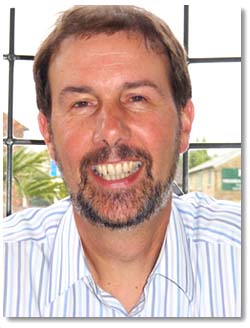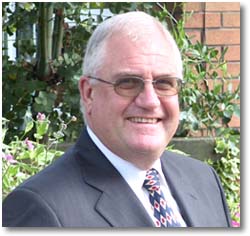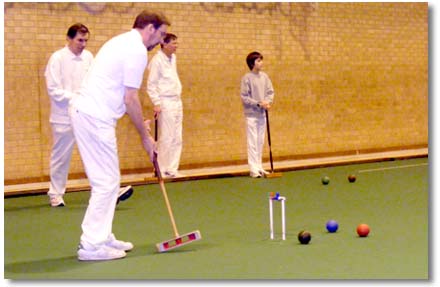

|
Back to |
| The Front Page |
| News & Features |

|
Interviewing Martin French, four months into the job |
|
Interview by Bob Alman Photos and Illustrations supplied by Martin French Posted March 17, 2011
|
The year 2010 was a tumultuous one for the World Croquet Federation. The issue of proliferating "world championships" occasioned much discussion and controversy. A long-time Secretary-General, Brian Storey, resigned his position as a consequence, and Chris Clarke of New Zealand was selected to replace him but soon resigned, himself, for unrelated reasons. As this interview shows, the "championships" issue is not yet completely settled, though putting the lessor of those championships into a separate "restricted" category makes a useful distinction by preserving the "world championship" branding for the two main singles competitions and the expanded World Teams. French is determined to promote transparency and practice fairness as the best prescription for regulating an organization with its management and administration divided between the president, Charles Jones in New Zealand, and Martin French on the other side of the world in East Anglia on the North Sea.
BOB ALMAN: You've had this job about four months, so by now you know its dimensions and priorities. What can you say, right up front, about what you've already accomplished, what the main priorities are, and especially what are the main unfinished items on the top of your priority list?

|
| Martin French spends up to 30 hours a week on WCF business, but hopes the pace will slow as the new season begins. He's planning to play more competitive croquet. |
So starting with the Management Committee, we've made it revolve around week-long email discussion cycles, where ideas, proposals and issues are refined until we can reach a decision. This mostly works quite well, and I report results and what we're discussing each month in Newsletters to the Members (and posted on the WCF website). We have just proposed to the Members, in a second major consultation piece, to extend this approach to Council. The cycles would have to be longer - probably 21 days - because Members need to have time to consult internally. But from what I'd seen from outside the WCF in past years, the existing way of taking votes in Council meetings with little discussion in advance between Members has not been ideal. Moving to email discussion cycles should give everyone more understanding of what other Members are thinking. So my number one priority is to make the WCF a more effective organisation, where the Members are much more engaged in making the decisions.

|
| French retired early in 2010 at 57 and took on the renovation of a 1930's house in an area of mainly late-Victorian red brick houses in East Anglia, where he lives with his wife Cathy. They're both graduates of Sussex University and parents of two sons pursuing science careers, like their parents. The snow in the photograph came with the last two abnormal winters. A five-minute walk through a park across the street leads to the two courts of the Ipswich Croquet Club with topology French describes as "interesting." |
My other main priority is to get the core of what we do - organising world championships - running a bit smoother. This was the subject of the first large consultation document sent to Members and we're awaiting responses any moment now. We want to establish and publish a 10 Year Schedule of when events of each type ought to be planned, and then annually invite bids to host them. Over a few years, we want to get to a situation where every event type is on a regular frequency of 2 or 4 years, and we avoid the "clumping" that has sometimes occurred. This will aid both hosts and players. There were a bunch of questions and issues about events too, which I'm hoping to resolve in the same consultation.
BOB: But in most organizations, there would be security concerns about having email conversations involving a number of people. For example, in the US my "sensational" confidential memo several years ago on the performance of a manager of the National Croquet Center was leaked by the Croquet Foundation of America board within one day of it's distribution by the president. He had included the strongest possible injunction to keep it confidential. That memo achieved wide currency, embarrassed any number of people, and was even included in a lawsuit, later withdrawn because everything in the memo was judged to be true and without malice. WikiLeaks is not going to go after the WCF, but if you have any discussion that is in any way interesting or sensational in content, it's going to leak. That's almost a law of public relations and human nature: If it's hot, and expecially if it involves well-known personalities, it's going to leak.
MARTIN: It is true that there is always the risk of leaks. So one of the best ways of dealing with the risk is simply to publish things anyway. The WCF has long published details many organisations might prefer to keep private, such as the business plan, accounts and minutes. We're trying to go further now and extend what we publish.
The real difficulty will always be with draft information. For example, where a sub-group have worked on an idea and come up with a proposal which has not yet been debated or agreed by the Management Committee. You have no idea at this stage whether it will become agreed policy or something thrown out by the wider group as mistaken - and yet you wouldn't want to stiffle innovation by not discussing new ideas just in case they leaked and were misunderstood. The other issue must be with personal data, where there is a legal right to confidentiality in specific regards - but fortunately the WCF doesn't handle that sort of information.
BOB: If people suspect you're hiding something or covering over something, you're dead in the water. There are hazards, though. You should never publish detailed minutes - that is, verbatim accounts of who said what, because that would stifle free and frank discussion. Verbatim accounts on Wikileaks have been the main sticking point in that fascinating unfolding drama.
But the strategy of inclusiveness also has its hazards. How far out do you extend discussion and consideration of important issues? In the present configuration of the WCF, it appears that you, alone, make that determination, since the president has chosen to be virtually invisible to the croquet world, and the Secretary-General represents the WCF to the world. You decide what to put on your blog or announce on the Nottingham; what to say in your reports to the Management Committee and the Council, when to put out press releases and what they contain. Does that make you uncomfortable? Don't you now you'll take the heat if you miscalculate factors that are sometimes unpredictable?
MARTIN: You're right that publishing verbatim accounts can be counter-productive - people will just shut up if they think they may be quoted out of context. And we all need to think aloud at times - and to say dumb things, too!
You can't expect me to accept your statement about our President! Charles Jones may not be very visible in the on-line world, but last summer (before I knew I was going to get involved in the WCF) I met him at the Nottingham MacRobertson Shield test and was very impressed at the way he got round all the teams and organisers there. It's because of the good impression he created that I decided to apply for the Secretary-General role. He is also planning to come to the England this July for the Golf Croquet World Championship, the Under 21s and the Council Meeting - that's a huge commitment of time and money for someone not actually playing in the events. He and I contribute to the public face of the WCF in different ways, which is good.
The more formal announcements do go through the Management Committee for approval. I might draft them first, but they then get a good going-over from the rest of the committee. But you're right that for many of the less formal announcements, I'm prepared to take responsibility for what I write. I will often get ideas from other members of the MC that shape what I write. I will, of course, get it wrong at times - but you have quite often to strike a balance between correctness and timeliness. If I miscalculate, then I'll take the heat. Besides, it makes life more exciting!

|
| Brian Storey streamlined the operations of the WCF during his long tenure as Secretary-General and set the stage for Chris Clarke and now Martin French to complete the globalization of administration and communications, while James Hawkins rebuilds the website. |
As circumstances have evolved, it seems to me that anyone who wants to do a "world championship" of any kind locally or regionally can do it with the blessing and sanctioning of the WCF. And the market will determine whether those events are viable; people will "vote" one policy by either playing in them or not. Is that the policy?
MARTIN: No. Although of course it will always be true that if no-one wants to host or play in an event, it will cease to be viable. We have recently passed control of our only regional event to the England Croquet Association.
We are actively seeking to sort out WCF policy by consulting Members at present. (http://www.wcfcroquet.org/Files/10_Yr_Schedule.pdf). I have heard it said we have too many events - but this is often because Members want different things. We all have our particular priorities - some countries favour Golf Croquet events, so want more of them. Some want Women's events. Some want team events. The WCF brings together 27 playing countries - and Members have different priorities. Just today I was reading one response to this consultation which thought there were perhaps too many events - but the same Association then suggested a new Under 21 AC world championship. This is how the calendar has grown.
So what we are doing in the 10-year schedule consultation is to nail down what level of events is acceptable to the Member countries. Then we have proposed that no new event types may be added without the explicit approval of Council. [EDITOR'S NOTE: The Council consists of representatives from each of the Members, and meetings may or may not include Management Committee members.] We're proposing a published 10-year rolling schedule of events - and this will only be expanded if the Members vote to add to it.
BOB: If your policy is to do what Members want and to be responsive to Members, I can understand and sympathize with that point of view. That was exactly my opinion until the debate in this magazine on the Association Croquet Women's World Championship. My position was that the market should rule. Any event somebody wanted to produce that would pay the sanction fee and follow the WCF rules would be okay. Then a large croquet player of my acquaintance who does not want to be identified by name or gender sent me a short email that said, "Bob, when they have the Obese World Championship, don't expect me to enroll." I don't expect anyone will seriously propose such a championship, any more than they'll do a Black World Championship or a GLBT World Championship. But the fact is, all of those categories are recognized political "minorities," just as women are. When I read that email, I understood for the first time why so many top women players were offended by the gender segregation. I can't help thinking that the WCF should be sensitive to those feelings, and the only way that can be expressed is in the policy-making body, the Management Committee, as I understand it. Don't you think the WCF should be sensitive to the feelings of these women, who say they feel relegated to second-class status?
MARTIN: Many people who I respect have very strong feelings on this issue - and on both sides of the argument. I have this problem of seeing both sides - I can always hear myself thinking "ah, but on the other hand...". For many years, my regular doubles partner was Debbie Cornelius - the top UK woman player at the time. She didn't like to play in the Women's Championship or the Ladies Eights - and we talked about the reasons many times. So I have an understanding of that view. But I also know players who are keen to compete in such an event because they have no difficulty with the concept and see it as paternalistic for an organisation to tell them they shouldn't want it.
My role in the WCF is to gauge what the Members want and to make it happen if at all possible. My personal views on this event are unimportant. There was discussion of this event at the last Council meeting, but I've been told it wasn't totally conclusive - so we have included it specifically in the 10 Year Schedule consultation to make sure we have accurately got the views of the Members.
BOB: Several "solutions" have been proposed which seem to me promising, though - I mean solutions that should not offend women, or men, or anyone except anal compulsive organizational types (which abound in the croquet world, I admit). In fact, the World Championship is open to everyone - including women, obese persons, gays, blacks, and all the political minorities. So couldn't you have a Women's Championship with a worldwide draw that wasn't labeled "Women's World Championship" and satisfy both sides of the debate? I say that because one of the solutions offered in our article was that women everywhere could be invited to the Women's Championship in Australia, which is already a strong event. Then you wouldn't risk diluting the "world championship" brand by sanctioning world championships that people don't regard as genuine world championships. The precedent for this would be the British Open, which has served in the past as the World Championship of croquet.
MARTIN: I don't have a strong opinion about event naming. I'm not sure changing the name of a Women's World Championship makes much difference to those fundamentally opposed to the concept of a segregated event though. I have one other thought on the question of event naming - that the players tend to ignore what organisers try to call things. In England about 20 years ago, a decision was taken to re-name the President's Cup as "The UK Masters". But the playing community continued to call it "the Pres" and the next year it went back to being the President's Cup! So we've included this as an explicit question in the 10 Year Schedule consultation - do Members want the "world championship" title reserved only for specific WCF events? I'm completely happy to go with whatever they collectively decide.
BOB: I notice in the document on the ten-year calendar you're leaving the door open to this ultimate solution, so I shouldn't risk beating a dead horse here. That document distinguishes the "restricted" world championships and reduces the license fee for them. Which brings me to the next question. How can the WCF afford to cut in half the license fees for all these events? You have salaries to pay for three staff positions, I believe, and other expenses. The goal is admirable - to support local organizers financially and enable more events to be held; but for how long can that be sustained?
MARTIN: Regarding event fees, the world is clearly currently in an era when it is much more difficult for hosts to obtain sponsorship. Event hosts may well find events make a loss. Last year at Council, it was decided that 50% of the entry fees be given to the host - we wanted to see if we could go further. Our Treasurer, Ian Burridge, produced a financial model tied to the 10 Year Schedule (which he also produced) - as income from events is our primary source. It is finely-balanced, but his advice to the MC is that we can afford to halve the license fees and will still just about break even in the medium term. Over the past two decades, the WCF has built up good reserves. We are not planning to run these down recklessly, but the reserves do mean we can afford to run on a much tighter margin that in the past. It seemed the right thing to do.
BOB: For your information, WCF events in the US always run at a loss, and the main reason is that we have no ability to enlist major corporate sponsors. Usually individual donors make up the difference. So the reduction in the license fee is really useful; and the ability to keep some or all the entry fees would help, too. That said, it doesn't seem to me that the WCF wastes money; quite the contrary - I'm amazed you get done as much as you do.
It seems to me, thought, that the main job is development, and I'm wondering who there is to carry the WCF development ball these days. Hall and Openshaw seemed ideal for that role and were always globe-trotting with a smile and an outstretched hand, from Tunisia to China and all parts between. But that's not a congenial role for Charles Jones, and my impression of you is that you're rooted there in England with the considerable burden of administration, so who's going to get India and Pakistan and Mexico up and running? Maybe ad hoc members of the Management Committee...? Or are Hall and Openshaw still recruitable for development missions?
MARTIN: You're quite right that development ought to be an approximately equal focus for the WCF - we're not just about running world championships. We have now got a small Development Group running within the MC, which Stephen Mulliner leads. A draft on policy and priorities has been circulated within the group. You can't go forward on all fronts at once though, so my first priorities have been: 1) to get the MC operating well and then propose similar improvements for Council, and 2) get the tournament programme onto a clear and agreed footing. But later in the year, we will need to put more attention into development.

|
| A number of one-day events in the winter are played on a very fast carpeted half-size court in a sports hall at Soham, a town near Cambridge. The hoops, difficult to run, are welded onto steel plates in the underlay. French won this regional speed doubles AC event in February with his partner and fellow Ipswich player Philip Eardley. |
Council last year confirmed the view that the WCF should focus on helping countries with an established croquet infrastructure expand and develop, rather than trying to 'seed' the sport in virgin territory. It looks likely we'll have two prospective members to put before Council in July, and we've had a couple of other enquiries. But to really help countries develop from a very early stage would require a lot of committed volunteer effort and finances we just don't have.
BOB: If you're helping countries with an established infrastructure expand and develop, maybe you can help James Hawkins get his Liverpool club get on the ground. It seems to me that Liverpool croquet lawns would be at least as useful as building a facility in Pakistan or footing the bill for courts in Sweden, and James has been efforting in Liverpool for several years. Could he apply for a WCF grant with any hope of being considered? Now that I've asked, I realize it's a serious question. What kind of development projects will the WCF seed in established countries?
MARTIN: I should explain more clearly what Council discussed last August. It was agreed that Development work should assist existing associations to improve by offering weekend coaching/ refereeing courses etc., and assisting countries who are keen to get a national croquet organisation started - but not “Missionary” development where we attempt to generate an interest in the sport within new countries.
We also work through our Member associations and do our best not to get between a Member association and its own member clubs and players. So James might decide to apply for a grant from the English Croquet Association. The Croquet Association (or any other Member association) might decide to apply for a grant from the WCF.
Of development ideas being discussed, I can give three examples which illustrate what seems a sensible approach to me:
1) arranging the translation of Rules, Laws, Commentary, or coaching materials - provided the Member concerned is willing to match the WCF funding (i.e. pay half each - a good general approach as it makes sure we're not just doing something because it seems like a good idea - both WCF and the Member need to be keen);2) organising a coaching or refereeing course to be held in the Member's country by paying a visiting expert's travel costs - or arranging a course in a larger Member's country that developing Members can attend perhaps while visiting for some other event;
3) helping a developing Member establish its first 4-lawn venue with a match-funded grant - as this then allows them to begin arranging international matches and events themselves.
BOB: That sounds sensible. And since James is busy redesigning the WCF website, he doesn't have time to invest right now in generating an active Liverpool club.
My main issue with the WCF website, by the way, has been its unattractiveness. Everything is there - if you can find it - but it's no fun to rummage around looking for it. Did I hear somewhere that it's built on a Dreamweaver platform - one that requires a lot of technical knowledge and skill to revise and add to? May I assume that when James completes his redesign, it will be both more attractive and easier for you to manage?
MARTIN: Our current website has served us well and contains a huge amount of information (over 3, 700 files!) but it's time for a refresh. I use Dreamweaver to edit it, but it's built in PHP with a number of add-ins that seem fairly arcane to me. I find it a challenge to update. The brief for James is to produce a new website which is easier for people to use and easier for the WCF to keep up-to-date.
BOB: With your advanced degree in computer science, you should be able to update it. And I'm assuming the website will be a more attractive place to be for the ordinary user, like me, when James finishes his work.
MARTIN: Ah, but it's 24 years since I last cut any serious code! And yes, we want to make the website easy and straightforward for everyone to use. We're considering user logins, so people can update their own player profiles, reply to surveys and so on.
BOB: Let's shift to the long view, now: Fifteen years ago, there was a great deal of suspicion of the organization in the UK, and especially of the possibility of England's losing its primacy in the sport. Those fears seem to have disappeared. In fact, the WCF has now taken on just about everything related to international development and competition - including administering the MacRobertson Shield and the World Teams. Why should the evolving laws of Association Croquet be still beyond the WCF's jurisdiction? When and how will that change?
MARTIN: There is always concern about "letting go" and passing control of anything to a different group. Openness helps defuse it, but isn't a panacea. The organisation of the Mac isn't a done deal - though steps seem to be moving towards that direction. As for the Laws of Association Croquet, it would make sense but I don't see it as urgent. The wider croquet community have got to feel they can trust the WCF to handle the Laws sensibly - and when they're ready, the WCF will be happy to oblige. In reality of course, the most likely way it would happen is that very much the same group of individuals from around the world who are currently on the International Laws Committee would continue to be the driving force, just under a WCF banner. It'll happen when people are ready.
BOB: You stopped writing computer code at just about the time the WCF came into being in 1986, with nine founding nations. Probably when you started playing croquet, you weren't very aware of the organization. You've just recently returned to competition following your long "retirement." What changes have you seen in the game? And what further changes need to be made - I mean besides having a more difficult hoop for top-level play?

|
| French is carrying through a pet project he started after his freelance work dried up a couple of years ago, developing a design for a faceted hoop more difficult to run than standard round-posted hoops. The hoop is no more difficult following a good approach and accurate hoop stroke, but less forgiving to poor play. He intends for the more challenging hoop to lead to more interactivity in major competitions. The faceted uprights are profiled in this drawing. |
Of course, Golf Croquet has also exploded from something that, in England at least, was a sleepy little club game - into a strong international version of the game. I'm entering my first proper GC event in a couple of months, to give it a go.
I don't have a big agenda of further changes that need to be made - I'm happy to respond to what the Members and players say they want. I'm a practical person, so I'm interested in finding a practical solution to the problem of "easy conditions" that can devalue top class AC events in a wet summer in England. I was lucky that in the 80s, we had a series of hot dry summers - lawns could be very difficult. This really sharpens your skills. I'd like to be able to re-create that even in a wetter summer - hence my trials of a faceted hoop.
BOB: The difference Golf Croquet is making reminds me of another, bigger question, which maybe gets us close to the end of this interview. As someone who has been more interested in development than anything - that is, to make sure that the game expands so much that abundant options are available at every location for every style of the game - I worry that the agenda of clubs, local and national organizations, and the WCF are centered too much on top-player concerns, because those players are the ones who tend to become most involved in the organizations. I also know that because of their prominence and visibility, the top players will manage the concerns that trouble them most on their own; they don't need the level and kind of support that beginning players need to maintain their interest in croquet.
All of which is fine, but not if what the top players want establishes the agenda for everyone - including the bread-and-butter social members in the local clubs.
I promoted Golf Croquet vigorously in San Francisco from the beginning of my work in building that local organization in the early eighties, and I promoted it in the books and articles I wrote before Golf Croquet had achieved the respectability given it by the prominence of the Egyptians. The players who disparaged "that stupid game" did real damage, and it's not easy for them to do that kind of damage today, because of the respectability the Egyptians have brought to Golf Croquet.
For that reason, I think maybe that one of the biggest gifts the WCF has given to the world is bringing Egypt into the worldwide "croquet club." Nobody has beaten them yet - not really; and that's a very great thing to happen to croquet.
Do you have the same high opinion of Golf Croquet with regard to its influence on the growth and health of the sport, worldwide?
MARTIN: When I was on CA Council at the end of the 80s, it was a common complaint then that the game was too focused on the wishes of top-players. I'm not sure it really was, but never mind. Coming back to CA Council 20 years later, I think it is more difficult to make such a claim stick now - many of the prime movers and committee leads are keen club players and middle-bisquers. And GC and AC seem about equally represented. I haven't yet had a chance to find out whether that's the same in other Member associations, but it seems pretty healthy in England to me now.
Having said all that, it is of course only right that when the WCF is charged with arranging world championships, we should absolutely be making sure they attract the very best players in the world.
It's been very good for croquet to get the new blood of both "the new Golf Croquet" and the Egyptian players. It's never good for anything to remain unchanged over time. So while I was personally pleased when Great Britain won the Mac last summer, I was also really excited that New Zealand came so close to beating them at home. It's good for the game to have such tough contests at the top.
BOB: So you agree that Egypt has given the game and the WCF a great gift with Egyptian Golf Croquet?
MARTIN: Yes, I do think that discovering Golf Croquet as played in Egypt has been a great positive in recent years. I do understand that many people - perhaps having not yet seen it played at the international level - still regard GC as a pale immitation of the "proper game". But that will change with more exposure. It seems to me that GC now has enough momentum to no longer need any special protection or promotion - and we are fortunate to have two good international forms of the game, AC & GC. I haven't yet watched top-class GC myself, so I'm looking forward to the Under 21s and the Golf Croquet World Championships being held in England this July.
BOB: Martin, I think it's a wrap. Thank you very much for the interview, and for taking on a demanding job for the World Croquet Federation on behalf of us all.